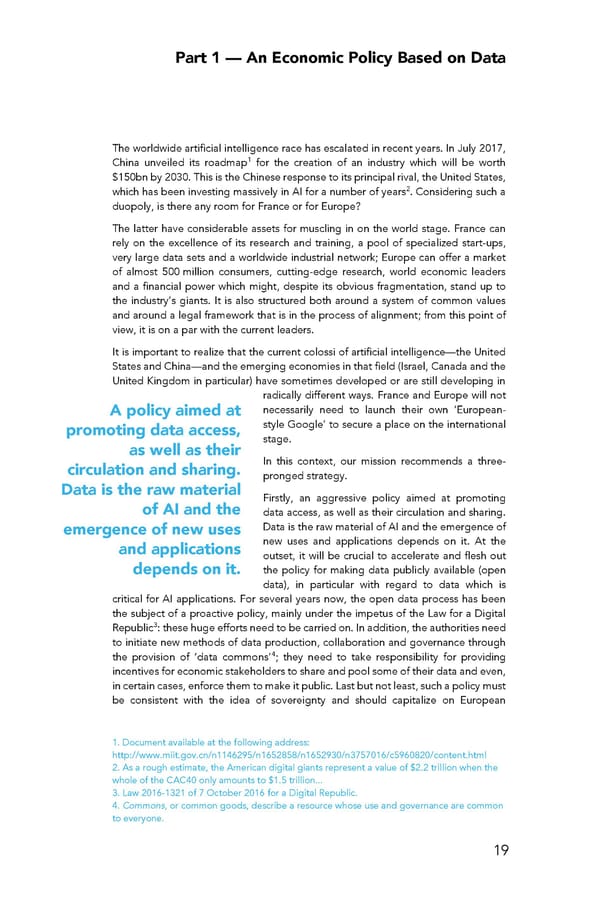Part 1 — An Economic Policy Based on Data The worldwide artificial intelligence race has escalated in recent years. In July 2017, China unveiled its roadmap1 for the creation of an industry which will be worth $150bn by 2030. This is the Chinese response to its principal rival, the United States, which has been investing massively in AI for a number of years2. Considering such a duopoly, is there any room for France or for Europe? The latter have considerable assets for muscling in on the world stage. France can rely on the excellence of its research and training, a pool of specialized start-ups, very large data sets and a worldwide industrial network; Europe can offer a market of almost 500 million consumers, cutting-edge research, world economic leaders and a financial power which might, despite its obvious fragmentation, stand up to the industry’s giants. It is also structured both around a system of common values and around a legal framework that is in the process of alignment; from this point of view, it is on a par with the current leaders. It is important to realize that the current colossi of artificial intelligence—the United States and China—and the emerging economies in that field (Israel, Canada and the United Kingdom in particular) have sometimes developed or are still developing in radically different ways. France and Europe will not A policy aimed at necessarily need to launch their own ‘European- promoting data access, style Google’ to secure a place on the international as well as their stage. circulation and sharing. In this context, our mission recommends a three- Data is the raw material pronged strategy. of AI and the Firstly, an aggressive policy aimed at promoting data access, as well as their circulation and sharing. emergence of new uses Data is the raw material of AI and the emergence of and applications new uses and applications depends on it. At the outset, it will be crucial to accelerate and flesh out depends on it. the policy for making data publicly available (open data), in particular with regard to data which is critical for AI applications. For several years now, the open data process has been the subject of a proactive policy, mainly under the impetus of the Law for a Digital Republic3: these huge efforts need to be carried on. In addition, the authorities need to initiate new methods of data production, collaboration and governance through the provision of ‘data commons’4; they need to take responsibility for providing incentives for economic stakeholders to share and pool some of their data and even, in certain cases, enforce them to make it public. Last but not least, such a policy must be consistent with the idea of sovereignty and should capitalize on European 1. Document available at the following address: http://www.miit.gov.cn/n1146295/n1652858/n1652930/n3757016/c5960820/content.html 2. As a rough estimate, the American digital giants represent a value of $2.2 trillion when the whole of the CAC40 only amounts to $1.5 trillion... 3. Law 2016-1321 of 7 October 2016 for a Digital Republic. 4. Commons, or common goods, describe a resource whose use and governance are common to everyone. 19
 For a Meaningful AI - Report Page 19 Page 21
For a Meaningful AI - Report Page 19 Page 21